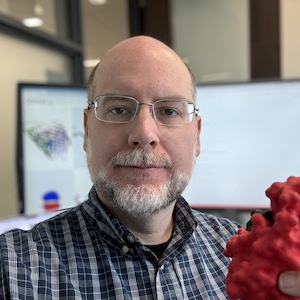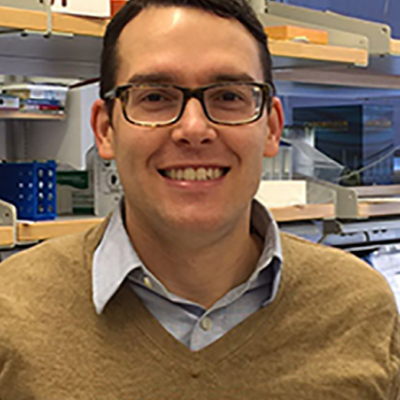Core Faculty
James Faeder
Program Director CPCB, Pitt
Associate Professor, Computational & Systems Biology, Pitt
- Developing mathematical models of biological regulatory processes that integrate specific knowledge about protein-protein interactions.
Carl Kingsford
Program Director CPCB, CMU
Hebert A. Simon Professor of Computer Science, Computational Biology, CMU
- Designing ML, combinatorial, and optimization algorithms to extract insight from genomics data.
Oana Carja
Assistant Professor, Computational Biology, CMU
- I work to quantitatively understand the evolutionary architecture of intelligent, collective systems, using the tools of dynamical systems, network theory, population genetics, machine learning and statistical inference, and widely available, yet underused, datasets.
David Koes
Program Associate Director CPCB, Pitt
Associate Professor, Computational & Systems Biology, Pitt
- We develop computational algorithms and full-scale systems to support rapid and inexpensive drug discovery and apply these methods to develop novel therapeutics with a focus on integrating machine learning, deep neural networks, and structure-based biophysical approaches.
Andreas Pfenning
Associate Professor, Computational Biology, CMU
- The neurogenomics laboratory studies how genome sequence differences influence behavior and neurological disorder predisposition.

- The evolution of pathogens such as HIV and SARS-CoV-2 presents a major threat to public health. My group works to combat this threat by studying how pathogens evolve and how they interact with the immune system. We’re particularly interested in questions related to the predictability of evolution and coevolution of hosts and pathogens. For example, which strains of a pathogen will become dominant in the near future? Can we control evolution to prevent pathogens from escaping immune control or developing resistance to drugs? Our work combines mathematical modeling, data analysis, and collaborations with experimentalists and clinicians to pursue these questions.

Assistant Professor, Computational Biology, CMU
- I study problems at the intersections of human genetics, statistics, quantitative psychology, and applied mathematics.

Drew Bridges
Assistant Professor, Department of Biological Sciences, CMU
- Lab we use diverse approaches to study how bacteria make developmental decisions based on extracellular sensory information. Read about our research for more information.
Carlos Camacho
- We develop new technologies to predict and model protein structures, their physical interactions, and substrates.
Anne-Ruxandra Carvunis
- Our research aims at understanding the molecular mechanisms of evolutionary change and innovation by examining systems biology in the light of evolution and evolution in the light of systems biology.

- We develop statistical and computational methods for analyzing bulk and single-cell multi-omics data and understanding complex diseases such as childhood asthma and age-related macular degeneration.
Yu-Chih Chen
- We aim to establish comprehensive high-throughput multi-omics single-cell analysis including genome, epigenome, transcriptome, proteome, functional, and morphological methods. With large amounts of data collected from high-throughput single-cell multi-omics analysis, machine learning techniques can predict patient prognosis and suggest treatments for precision medicine.
Maria Chikina
Assistant Professor, Computational & Systems Biology, Pitt
- The goal of Dr. Chikina’s research is to use genome scale data to advance our understanding of how genes contribute to the function of a complex organism, in health and disease.
Lillian Chong
Professor, Chemistry, Pitt
- Research in the Chong lab involves the development and application of molecular simulation approaches to model a variety of biophysical processes.
Publications

Associate Professor, Department Biological Sciences, Pitt
- The Clark lab uses comparative genomics to construct genetic networks and infer the functions of genes and regulatory regions underlying key adaptive and health-related traits.
Vaughn Cooper
Professor, Microbiology and Molecular Genetics, Pitt
- We study evolution-in-action in the laboratory, in infections, and in cancers using genomics to identify and ultimately predict adaptations.
Christian Cuba Samaniego
Assistant Professor, Computational Biology, CMU
- As an interdisciplinary research laboratory, our goal is to make the paradigms of Machine Learning and Feedback Control accessible and readily applicable in Biology. We focus on developing computational/theoretical and experimental tools to facilitate this integration across various biological systems, ranging from single cell to multicellular levels.
Jishnu Das
Assistant Professor, Immunology & Computational & Systems Biology, Pitt
- Our research focuses on the development and use of machine-learning, high-dimensional statistical and topological network-analyses methods for biologically meaningful integration of multi-omic datasets. These analyses help us understand immune mechanisms in a wide range of contexts, encompassing both natural and vaccine-mediated immunity.
Dannie Durand
Associate Professor, Biological Sciences, CMU
- Computational molecular biology and computational genomics; especially, the evolution of genomic organization and function.

Associate Professor, Biological Sciences, Pitt
- Develop broadly applicable, innovative computer-aided drug design (CADD) techniques and apply those techniques to further infectious-disease, neurological, and cancer drug discovery.

Assistant Professor, Chemical Engineering, Chemistry, CMU
- The Gomes Group research program focuses on the development of new chemical reactions, catalysts, and materials using and developing state-of-the-art machine learning and automated synthesis.
Rachel Gottschalk
Assistant Professor, Immunology, Pitt
- Our lab uses quantitative approaches to understand how cells process stimuli to determine the appropriate functional response. Identifying the activating receptors, kinases and trascription factors that make up signaling pathways is necessary but not sufficient to predict how a cell will respond.
Mert Gur
Associate Professor, Computational & Systems Biology, Pitt
- We specialize in solving problems at the interface of medicine, biology, and engineering, using computational modeling and statistical thermodynamics methods. Our research interests include (i) protein systems including known and potential drug targets and (ii) proteins with complex functional machinery, comparable to macro scaled machines we encounter in daily life.

Assistant Professor of Medicine, Division of Geriatric Medicine, Aging Institute, Pitt
- Understanding the biology of aging and age-related diseases with focuses on identifying the signaling mechanisms that drive aging in response to endogenous DNA damage. By defining these molecular mechanism(s), she hopes to identify novel therapeutic targets that can be exploited to extend healthspan.
Olexandr Isayev
Associate Professor, Chemistry, CMU
- Theoretical and computational chemistry, machine learning, cheminformatics, drug discovery, computer-aided molecular design, materials informatics

Assistant Professor, Computational & Systems Biology, Pitt
- Synthetic morphogenesis of 3D tissues. Brain and cardiac organoids. We integrate high-throughput 3D imaging, genome engineering, and pharmacology to control cell fate and tissue morphology.

Assistant Professor, Biological Sciences, CMU
Computational Biology, CMU
- The Kaplow Lab leverages genomics experiments and develops machine learning methods to decipher transcriptional regulatory mechanisms involved in mammalian phenotype evolution.
Dennis Kostka
Associate Professor, Computational & Systems Biology, Pitt
- We model epigenomic marks during differentiation and development and build methods to elucidate the role of transcriptional enhancer sequences in vertebrate left-right patterning.

Professor of Medicine, Rheumatology, Pitt
- Our laboratory effort is focused on understanding scleroderma (systemic sclerosis), and developing novel therapeutic approaches based on identifying biomarkers of the disease process and utilizing biomarkers in clinical trials.
Robin E. C. Lee
Associate Professor, Computational & Systems Biology, Pitt
- We use single cell experiments and mathematical models to understand how cells process information to make cell fate decisions.

Assistant Professor, Pathology, Pitt
- Our lab is interested in bioinformatics and biostatistics analysis on high-throughput genomic data, such as multi-omics Microarray and sequencing data.
Nate Lord
Assistant Professor, Computational & Systems Biology, Pitt
- Developing embryos must orchestrate the fates and movements of their cells with precision. However, precise control is no easy feat; genetic mutations, unexpected environmental perturbations and noisy signaling all threaten to scramble communication. Despite these challenges, development is remarkably robust. Our lab tackles these challenges with a combination of optogenetic manipulation, quantitative microscopy, computational modeling and classical embryology. Over the long run, we hope to learn the mechanistic principles that enable embryos to avoid and correct errors in development.
Xinghua Lu
Professor, Biomedical Informatics, Pitt
- Computational methods to identify signaling pathways underlying biological processes and diseases as well as statistical methods for acquiring knowledge from biomedical literature.
Jose Lugo-Martinez
Assistant Professor, Computational Biology, CMU
Co-Director of MSAS Program, CMU
- Developing the next generation of mechanism-driven computational methods to perform learning, inference, and decision-making on biomedical and health care data to accelerate scientific knowledge discovery and generate confident and testable data-driven discoveries.
Publications
Jian Ma
Ray and Stephanie Lane Professor of Computational Biology, CMU
- Developing novel algorithms to study genome structure and function, chromatin and nuclear genome organization, and gene regulation in mammalian genomes as well as in cancer.
Curtis McCloskey
Assistant Professor, Pitt
- I’m a translational systems biologist with a focus on breast and ovarian cancer biology. My lab is guided by a lens of cancer prevention, integrating functional and computational approaches to drive progress in precision prevention and precision treatment across the clinical spectrum.
Allyson F. O'Donnell
Assistant Professor, Biological Sciences, Pitt
- Our research focuses on how cells control protein localization in response to nutritional and environmental stressors. We are interested in gaining a deep mechanistic understanding of how the ‘decisions’ are made to selectively relocalize membrane proteins via vesicle-mediated trafficking in response to cellular signaling cues. We use a wealth of biochemical, genetic and cell biological approaches, including high content and systems level studies, in our work.

Professor and Vice Chair, Pharmacology and Chemical Biology, Director of Education at Womens Cancer Research Center, Pitt
- Molecular mechanism and clinical relevance of endocrine response in breast cancer
Hatice Ülkü Osmanbeyoğlu
Assistant Professor, Biomedical Informatics, Pitt
- Our research focuses on developing data-driven computational approaches to understand disease mechanisms in order to assist in the development of personalizing anticancer treatments.
Roni Rosenfeld
Professor & Department Head Machine Learning, CMU
Professor, Language Technologies Institute, Computer Science, Computational Biology, CMU
- The long-term vision of our DELPHI research group is to make epidemiological forecasting as universally accepted and useful as weather forecasting is today.
Frederick (Fritz) P. Roth
Professor & Chair, Computational & Systems Biology, Pitt
- Our research team engages in both experimental and computational genomic technology development. We have a major focus on comprehensively measuring the functional impact of human variants and how these impacts depend on environmental and genetic context, and on training the next generation of context-dependent variant effect predictors. A second focus is on systematically mapping and analyzing protein interaction networks and network dynamics across environmental contexts.
Russell Schwartz
Professor & Department Head Computational Biology, CMU
Professor, Biological Sciences, CMU
- Computational genomics, population genetics, and phylogenetics, cancer heterogeneity and progression, computational biophysics, simulation and model inference of complex reaction networks.
Harinder Singh
Director, Center for Systems Immunology, Pitt
Professor, Immunology, Pitt
- The analysis of transcription factors and gene regulatory networks that regulate the development and functioning of innate and adaptive cells of the immune system.
Wayne Stallaert
Assistant Professor, Computational & Systems Biology, Pitt
- Cell cycle plasticity in human health and disease.
Publications

Professor and Vice Chair for Research, Department of Biostatistics, Pitt
Professor, Human Genetics, Computational & Systems Biology, Pitt
- We develop rigorous, timely, and useful statistical and computational methodologies to understand disease mechanisms and improve disease diagnosis and treatment.
Shikhar Uttam
Assistant Professor, Computational & Systems Biology, Pitt
- We study cancer systems biology of tumor microenvironments at multiple scales by integrating high-dimensional microscopy, imaging and data science, and systems and bioinformatics approaches.

Assistant Professor, Machine Learning Department, CMU
- Our research focuses on AI for equitable, data-driven decision making in high-stakes social settings, integrating methods from machine learning, optimization, and causal inference.

Assistant Professor, Biomedical Informatics, Pitt
- Developing new strategies for treating pathogens in the clinic, ultimately turning the tide against increasing antibiotic resistance.
Eric Xing
*Currently on leave of absence
Professor, Machine Learning, Language Technologies Institute, Computer Science, CMU
- We develop machine learning, statistical methodology, and computational systems for solving problems of learning, reasoning, and decision-making in artificial, biological, and social systems.
Jianhua Xing
Professor, Computational & Systems Biology, Pitt
- The lab uses theory and data-driven computational modeling, as well as single cell techniques including live cell imaging, sequencing, and other approaches to study the fundamental questions how a cell regulate and maintain its phenotype, and how a phenotypic transition proceeds and can be controlled.
Min Xu
Associate Professor, Computational Biology, CMU
Co-Director of MSCB, CMU
- We develop computational methods for modeling cell organization derived from electron cryotomography 3D images.

Assistant Professor, Computational Biology, CMU
- Applying string algorithms and probabilistic sketches to genomics and medical privacy.
Martin Jinye Zhang
Assistant Professor, Computational Biology Department, CMU
- I develop computational methods to integrate genetics (e.g., GWAS) and functional genomics (e.g., scRNA-seq) to decipher genetic basis of diseases and complex traits.
Teaching Faculty

Associate Professor, Computational & Systems Biology, Pitt
- Design and implement innovative research and training efforts for trainees at all levels.

Assistant Teaching Professor, Computational Biology, CMU
- Algorithms design and applied machine learning for the algorithm
configuration problem on tools used for biological sequences.

Associate Teaching Professor, Computational Biology, CMU
Co-Director of MSAS Program, CMU






































